My Guardian obituary on the late, great Bahram Beyzaie can be read here.
Monday, 29 December 2025
Saturday, 27 December 2025
RIP Bahram Beyzaie (1938-2025)
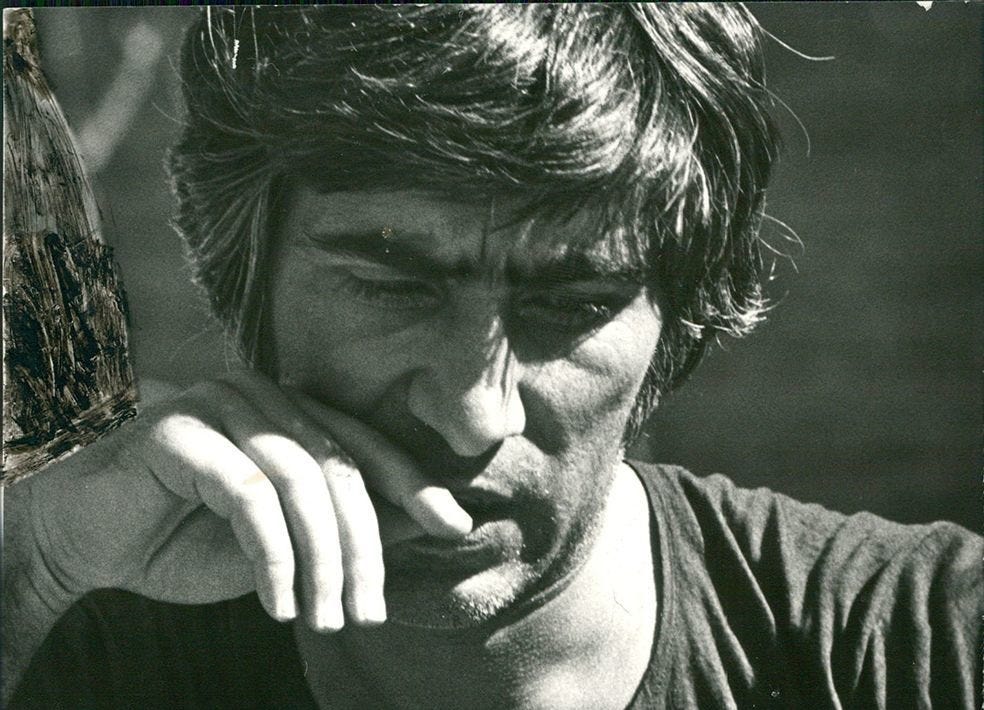 |
| Bahram Beyzaie |
One of the guiding lights of Iranian modernist cinema since 1969, and an equally invaluable force in theater, literature, and history, Bahram Beyzaie passed away yesterday in California, where he had been based for the past 15 years.
For public screenings of his films, I have previously reviewed at least five of his works, which I share again here in memory of one of Iranian cinema’s most brilliant figures.
Ragbar [Downpour] (1972)
Safar [Journey] (1972)
Gharibeh va Meh [The Stranger and the Fog] (1974)
Kalagh [Crow aka Raven] (1977)
Cherike-ye Tara [The Ballad of Tara] (1979)
Ragbar [Downpour] (Bahram Beyzaie, 1972)
In this, one of the most accessible and beloved Iranian New Wave films, a young teacher is sent to a school in the impoverished south end of Tehran, where he falls in love with his student’s elder sister, and directs all his energy into helping the students put on a stage show. Moving, witty, and brilliantly directed in an energetic and unusual combination of neorealism and political symbolism, Bahram Beyzaie’s first feature was realized with a shoestring budget but managed with astounding success to blend its director’s roots in theater, literature, and film history with a story that, even to this day, resonates powerfully with Iranians. — EK
Monday, 22 December 2025
Ladies in Retirement (Charles Vidor, 1941)
Based on the Broadway play, Ladies in Retirement is one of Columbia Pictures’ very few Gothic films, and one of the finest of the genre in the 1940s. Ida Lupino plays a spinster housekeeper and live-in companion who brings her “crazy” sisters (Elsa Lanchester and Edith Barrett) to the secluded mansion, later joined by their shady nephew (Louis Hayward) whose main interest is in the wealth of the gullible lady of the house.
Sunday, 21 December 2025
Masterpieces of the Iranian New Wave, Part II at the Barbican, London
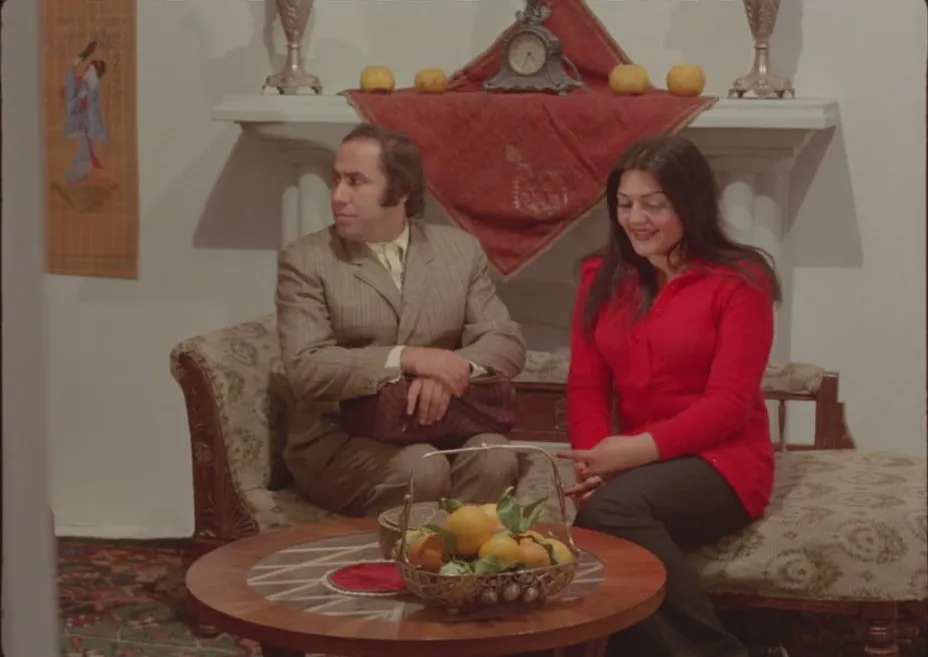 |
| Secrets of the Jinn Valley Treasure |
Following the Barbican Centre’s sell-out programme Masterpieces of the Iranian New Wave in February 2025, the second part will present an even richer array of rare cinematic gems, many of them never before seen in the UK.
Featuring numerous new restorations, this expanded foray into the classics of Iranian cinema that first brought worldwide admiration to the nation’s film culture will include the world premiere of the newly restored director’s-cut version of Ebrahim Golestan’s satirical film Secrets of the Jinn Valley Treasure. Starring Parviz Sayyad, Mary Apick, and Shahnaz Tehrani, this long-unseen version has been restored by Cineteca di Bologna in partnership with the Iran Heritage Foundation.
Saturday, 20 December 2025
Interview with Shadi Abdel Salam
Conducted by Tehran International Film Festival and published in their daily journal, November 28, 1974. Originally in Persian. Abdel Salam’s words are glamorous, barren, and true—like his film Al-Mummia. The translation is mine. — EK
Al-Mummia, your first feature film, made in 1969 and received great critical attention, has not yet been screened in Egypt. Can you explain this?
Shadi Abdel Salam: I don't really know why the film wasn't shown. Maybe the authorities are afraid that people won't understand it. Anyway, my job is to make a film, not to navigate the labyrinths of bureaucracy. Currently, there isn't even a copy of this film in Egypt to participate in festivals.
Sight & Sound | The best films of 2025
Monday, 1 December 2025
Athens Avant-Garde Film Festival | Restored section's introduction and notes
Introduction to and programme notes for the "restored and beautiful" section at the 14th Athens Avant-Garde Film Festival, December 2025. — EK
The films in this section, spanning six formative decades of cinema history, start and end in the Middle East, offering a sense of the resilience of its people. The canonical documentary masterpiece Grass (1925) follows three Americans traveling among the nomadic tribes of Iran, while Ghazl El-Banat (1985) adopts an insider’s point of view in which the great Arab filmmaker Jocelyne Saab gently removes the shrapnel from the wounded body of her hometown, Beirut.
If Ghazl El-Banat is its director’s finest work, then Craig’s Wife (1936) is the masterpiece of American director Dorothy Arzner. A tale of a toxic lady of the house, no melodrama has so precisely and exhilaratingly explored the intertwined themes of house, territory, and power.
Wednesday, 26 November 2025
My Sister Eileen (Alexander Hall, 1942)
Based on a play by Joseph A. Fields and Jerome Chodorov—which itself was adapted from a series of autobiographical short stories by Ruth McKenney—My Sister Eileen was later remade by Columbia in 1955 as a CinemaScope musical directed by Richard Quine. It follows the misadventures of two Ohio sisters in their search for love, fortune and an apartment to rent in New York. Rosalind Russell plays the older sister, determined to pursue a career in journalism, while also finding herself both chaperoning and competing with her younger sister Eileen (Janet Blair), whose dream of becoming an actress draws all the wrong people to their cramped basement apartment.
Tuesday, 25 November 2025
None Shall Escape (André De Toth, 1944)
Playing at Harvard Film Archive on December 8 and 14. — EK
A rare exposé of Nazi atrocities made while the crimes were still ongoing, None Shall Escape is boldly framed as a speculative post-war tribunal that revisits the actions of a German schoolteacher (Alexander Knox) turned Nazi and the horrors he inflicted on a Polish village. Impressed by André De Toth’s Hungarian films, Harry Cohn hired the director after his arrival in the US in 1940. Following a routine B-movie assignment, De Toth—who had personally witnessed and even filmed the Nazi occupation of Poland—was given None Shall Escape; its title echoing President Roosevelt’s pledge of postwar justice.
Monday, 24 November 2025
Arbaeen (Nasser Taghvai, 1970)
Arbaeen (Nasser Taghvai, 1970)
During the annual mourning ritual held on the 40th day after the martyrdom of the Shia Imam, Hossein, men in the southern city of Bushehr rhythmically strike their chests in time with the recited elegies. In this short documentary shot in colour (Mehrdad Fakhimi's work), director Nasser Taghvai uses the sounds of environment to create a rhythmic editing, in sync with the movements and solemn strikes of the bare-chested men. There are occasional digressions to symbolic cutaways – common in Iran New Wave – of people outside and even a pair of dead fishes washed ashore.
Friday, 21 November 2025
Cheshmeh [The Spring] (Arby Ovanessian, 1971)
A film of unravelled mysteries and repressed longings, in Cheshmeh the nonlinear narrative, moving freely in time, is set in a Muslim community but is centered around a Christian woman who is the love interest of two men and married to a third. The interwoven fates are destined to end in tragedy, but the film leaves what potentially comprises a tragedy off-frame. Despite its richness in Armenian details (which was the cultural heritage of its director Arby Ovanessian), the film shares a significant number of threads with the Iranian New Wave films, particularly in its sense of isolation and fear of strangers, but also sets the hypnotic, numbing pace that the works of some of Ovanessian's contemporaries were going to be known for.
Thursday, 20 November 2025
The Spat-on Messenger: Youssef Chahine in Conversation with Tom Luddy
 |
| Youssef Chahine |
Bologna, June 2019. I spotted an Arab name on the badge of the hotel's night porter. When I asked, he turned out to be one—an Egyptian. I mentioned to him that Youssef Chahine's films would be playing in Bologna for the next few days. His face lit up. A floodgate of emotions, about Egypt, his past, and cinema opened, temporarily drowned him in nostalgia, passion and regret. He shared stories of Chahine, of his beloved Alexandria. He even cursed the extra who had forgotten to remove his wristwatch during the battle scene of Salah Eddin (a film about the Crusade, from the Arabs' point of view). According to him, by doing so he had prevented the film from entering the Oscar competition.
Very few directors can make that impact on their people, endowing them with a sense of pride and identity. Chahine's generosity with emotions is contagious. In reaction to a Chahine film, it is as legit to dance or holler as it is to write an essay. In Bologna the scholar and musician Amal Guermazi decided to sing, as her introduction to Al Ard.
Sometimes effortlessly Ophulsian (especially in the '70s, in the fluidity of his carousel-like narratives) and sometimes dialectically Chaplinesque, Chahine brought together the seemingly irreconcilable worlds existing in 20th-century Egypt and gave them a sense of harmony. There was a wise calmness about him. He had every reason to be angry, but instead he gave a sad smile which became the Chahine cinema.
Aligned with Pan-Arabic sentiments, he looked beyond Egypt, too. However, his Algeria-set Djamilah (1958) is nearly impossible to see in a cinema. Telling the story of the Algerian Independence War fighter Djamila Bouhired, it has been absent from recent Chahine retrospectives. It's an anti-French film, in exactly the same manner that hundreds of western films, including some French ones, have been anti-Arab. But it's more than just tit-for-tat—it is a celebration of change in the Arab world, done in the best of Hollywood traditions which Chahine adored. Find the film and show it! (For the Chahine tribute at Il Cinema Ritrovato, we tracked down a print in Albania but the subtitles were so big, covering almost half the screen, in the process turning them into Godardian onscreen statements.)
Tuesday, 18 November 2025
Abbas Kiarostami’s Early Shorts and Features: Poetic Solutions to Philosophical Problems
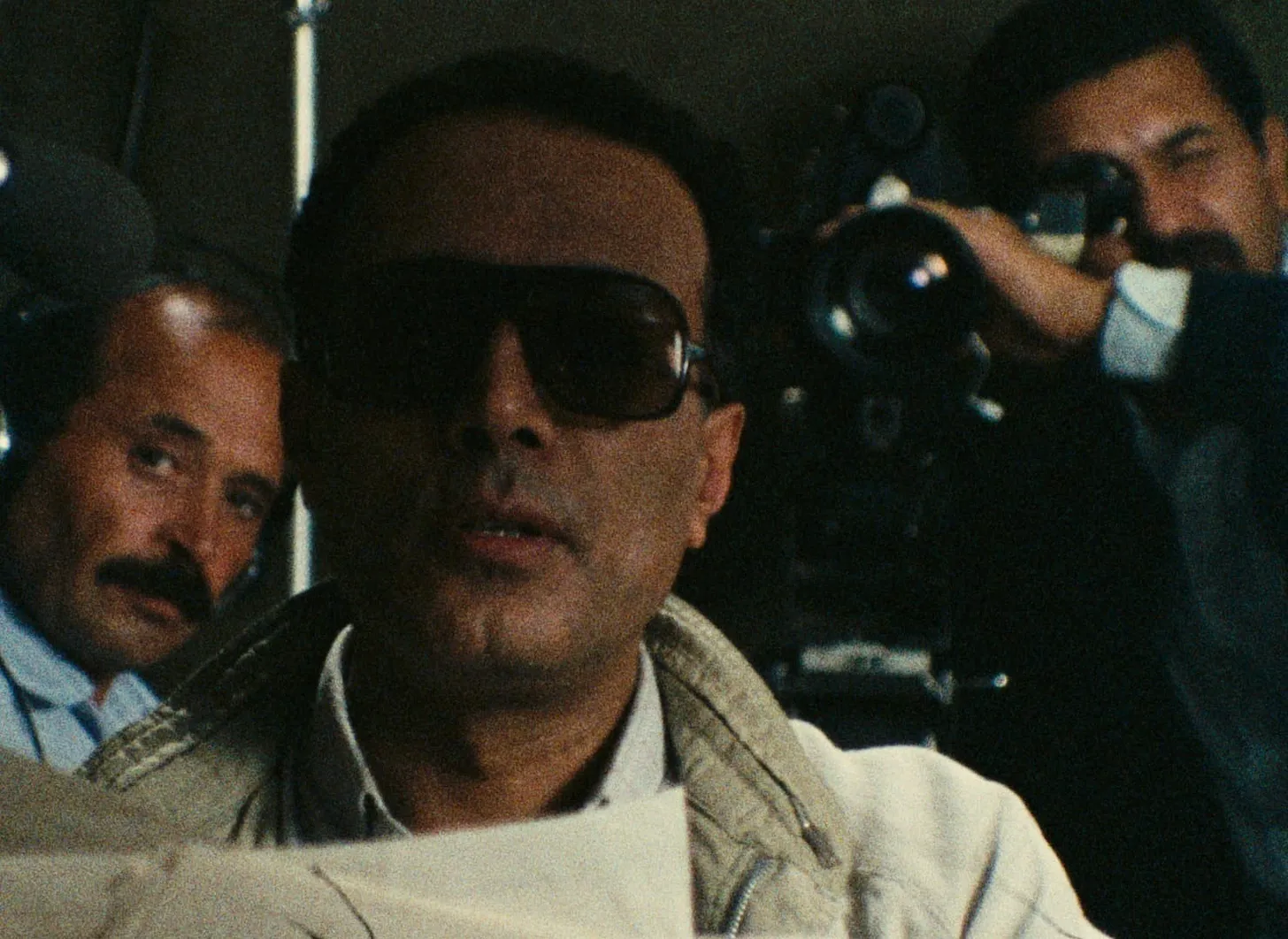 |
| Abbas Kiarostami in Homework |
An essay written for the Criterion release of Abbas Kiarostami’s Early Shorts and Features Blu-ray set. – EK
Abbas Kiarostami’s cinema is one of journeys. His films travel meandering routes, and his own path to international fame and recognition as one of cinema’s greatest directors was likewise mysteriously understated and subtle, almost imperceptible: a journey with marvelous detours.
Across a career marked by restlessness, which saw him making films not only in Iran but in France, Uganda, Italy, and Japan, the tireless filmmaker repeatedly reset his rules, moved from analog to digital, and transitioned from narrative film to video installations. Even as he came to be celebrated worldwide for beloved films such as Close-up (1990) and The Wind Will Carry Us (1999), whenever the conventional definitions of cinema became too limiting for him, he pursued creativity elsewhere. He rewrote classic Persian poems and published them in books of sparse, haikulike verses that resemble images, and he took strikingly abstract photographs of solitary trees in snow that feel like distilled poetry. His life was proof that a filmmaker could create singular images even without a movie camera.
The Deep Blue Sea (Anatole Litvak, 1955)
 |
| Italian poster for The Deep Blue Sea |
The Deep Blue Sea plays at Closeup Cinema in London on December 28, 2025 from a rare 16mm print. – EK
THE DEEP BLUE SEA
This rarest of all Anatole Litvak films is about Hester, a middle-aged woman whose suicide attempt at the beginning of the story sparks off two flashbacks, one from the point of view of the upper-class husband she has abandoned and the other from the view of the younger, capricious ex-RAF pilot for whom she has left her husband. Back to the present, the film revolves around her desperate attempt to win back her lover, only to realise she is yearning for something she can’t have.
Thursday, 13 November 2025
The Footage Found Me – Reflections on Celluloid Underground
My written introduction to the screening of Celluloid Underground at UnArchive Found Footage Fest in Rome, read out by Alina Marazzi. – EK
* * *
This is a film about an underground film collector, Ahmad Jorghanian. He was my friend. But I didn’t know how to tell his story. I tried ten years ago – and I failed. I abandoned the project altogether until, five years ago, I began having recurrent nightmares. They helped me get back on track and try to make the film again.
When you have one layer of a story and don’t know how to deal with it – don’t deal with it; Just add another layer. I ended up adding layer after layer: there is Ahmad; there is me on the screen, which I can’t bear; there is the history of film culture in Iran from two different angles – pre- and post-revolutionary; there is the story of the banned movie star Fardin; there is the history of film formats, from 35mm to digital; the story is also told through movie posters, in which I am The Son of Dr. Jekyll; and there is the story of an East London neighbourhood where Hitchcock was born.
The film was shot over the course of 25 years, in many different formats. I was in the business of creating an imaginary map of the world – of people and things I liked – without any immediate plans to turn them into a film. Among the things I like, and that made this film, are: Omar Khayyam, John Berger, coffee, Shahla Riahi (the first woman to direct a film in Iran), jazz, Luigi Comencini, trees, the recently murdered filmmaker Dariush Mehrjui, trains, Enrico Ghezzi, walks, Ebrahim Golestan, more trees, Chris Marker, Ana Mariscal. Some of the lines in the film are stolen from them. When you hear “the chaos of memories,” that’s not me. That’s Walter Benjamin.
Tuesday, 11 November 2025
Till We Meet Again (Frank Borzage, 1944)
Catalogue note (Il Cinema Ritrovato 2025) on the restored version of Till We Meet Again (Frank Borzage, 1944). — EK
Ray Milland’s John, a grounded American pilot in Nazi-occupied France, is helped by a young nun (Barbara Britton) who, in order to facilitate his escape, dresses as a civilian. In doing so, the two develop an unspoken desire for each other.
Sunday, 9 November 2025
Rouben Mamoulian in/on Mexico
 |
| Mamoulian (third from right) on the set of The Gay Desperado, a major hit when I played the film at Morelia International Film Festival in October 2025 |
Catalogue note for the Imaginary Mexico section of Morelia International Film Festival. — EK
It was not only Mexico that Rouben Mamoulian’s imagination transformed into a cinematic feast over the course of his illustrious career. Born in Tbilisi to an Armenian family, this classic Hollywood master used cinema as both a painter’s canvas and a musical score to reimagine cultures, countries, and cities—including those he knew well and had lived in. Thus, through a series of films now considered canonical classics, Soviet Moscow, Victorian London, and Imperial Sweden were rendered in unexpected colours, where life often unfolds with a lyrical, almost musical, rhythm.
Three of Mamoulian’s films have connections to Mexico: The Gay Desperado (1936) is set in Mexico but was actually shot in Arizona. The Mark of Zorro (1940) takes place in Alta California, filmed in Southern California. Blood and Sand (1941) is set in Spain, but was partially shot in Mexico. Even if these portrayals stem from the familiarly ahistorical blend of Hispanic culture, Hollywood glitter, and Mexican imagery, they nevertheless brim with joy and visual splendour, flourishing within their imaginary and impossible terrains.
Thursday, 30 October 2025
Jazz In Exile – Big Ben: Ben Webster in Europe & Cecil Taylor à Paris
Jazz on Screen at the Barbican, Cinema 1, Sun 16 Nov 2025
Jazz In Exile – Big Ben: Ben Webster in Europe & Cecil Taylor à Paris + Intro by Ehsan Khoshbakht
This double bill offers two distinct portraits of ground-breaking American jazz musicians living and working in Europe, each navigating cultural displacement in their own unique way.
Big Ben: Ben Webster in Europe (1967) offers a lyrical, offstage portrait of a legendary saxophonist in Amsterdam. Ben Webster cooks, films his own life and reflects on the blues. In the film, his music and spirit explored through poetic visuals and intimate moments.
Cecil Taylor à Paris (1968) is a fierce, fast-cut portrait of an avant-garde pianist in Paris, rejecting the European canon and rooting his explosive sound in the Black American experience. The filmmaking mirrors the music’s energy, becoming a bold improvisation of its own.
Together, they reveal what it meant to be a Black jazz artist abroad, displaced not just by geography, but by culture, politics and sound.
Jazz on a Summer's Day (Bert Stern, 1959)
Review of the Blu-ray release for Sight & Sound, March-April 2023. – EK
Jazz on a Summer's Day
The annual Newport Jazz Festival in Rhode Island received its only movie treatment thanks to Bert Stern, a photographer famous for his portraits of female stars and models – which should explain the film's fascination with fashion and the idea of the "cool". Here the attitude of the performer – the magnificent detachment of Thelonious Monk, the movie-star glamour of Anita O'Day – is as important as the sound. Equally instrumental in the direction (though, to his dismay, uncredited) and responsible for editing the film was Aram Avakian, who constructs the rapport between the performers and the festival audience, both captured at graceful ease.
Thursday, 18 September 2025
Symphony in Black: A Rhapsody of Negro Life (Fred Waller, 1935)
 |
| Billie Holiday in Symphony in Black |
Duke Ellington receives a telegram reminding him of his forthcoming concert in two weeks’ time—not a terribly long notice for finishing an extended composition that seemingly hasn’t been touched before, but most probably accurate, since Ellington was one of the greatest procrastinators in jazz, often writing right up until the curtain rose.
Monday, 15 September 2025
Jammin' the Blues (Djon Mili, 1944)
 |
Like Forough Farrokhzad and Jean Genet, the Albanian-born Djon Mili belongs to that small group of artists who, when counted officially (theatrical release of a completed film), might have directed only one short film. Yet that short, entitled Jammin' the Blues (1944), remains a touchstone of jazz on film.
Wednesday, 10 September 2025
The Brave Bulls (Robert Rossen, 1951)
The Brave Bulls was Robert Rossen’s final film in a cycle of four complex explorations of corruption and fear (Johnny O'clock, The Undercover Man, All the King's Men) that he either directed or wrote for Columbia. A brutally frank bullfighting drama, the film follows a matador (Mel Ferrer) who, beginning to crack under the pressure of his profession and a newfound fear of the ring, seeks to reclaim control over his life. Anthony Quinn plays a typically Rossenian character—a charismatic manipulator who, like Broderick Crawford in All the King’s Men, holds the power to both redeem and destroy.
Sunday, 7 September 2025
Address Unknown (William Cameron Menzies, 1944)
Playing at Harvard Film Archive on November 8, 2025, as part of "Columbia Rarities". — EK
In 1930s Germany, a congenial gallery owner falls under the spell of Nazism. A chilling work of strong political conviction, the film unfolds through the symmetrically menacing compositions of art-director-turned-director William Cameron Menzies. Based on a 1938 short story by Kathrine Kressmann which originally unfolded through a series of letters exchanged between a Jewish art dealer living in San Francisco and his business partner, the film was made thanks to a group of talented exiles and refugees. The cast includes Viennese actors Carl Esmond and Mady Christians, Hungarian Paul Lukas and German Peter van Eyck, and it was shot by Polish-Hungarian cinematographer Rudolph Maté, with a score composed by the Austrian Ernst Toch. But the most striking aspect of the film is its design. Menzies—widely regarded as the father of production design—created 800 sketches that served as the film’s visual blueprint. Shapes and forms, vertical and horizontal lines, all add new layers of meaning to Menzies’ finest directorial work.
Tuesday, 2 September 2025
The Unknown Brilliance – A conversation about Locarno's British postwar cinema retrospective
 |
| Mandy |
Transcription of a radio interview on the Locarno Film Festival's British postwar cinema retrospective (which I curated), conducted by Julia Baschiera of Austrian broadcaster Österreichischer Rundfunk and Patrick Wellinski of German station Deutschlandfunk Kultur. This was done over Zoom in late July 2025. Transcription and mild editing is mine. – EK
ORF/Deutschlandfunk Kultur: Maybe you start by explaining to me the retrospective—why you chose the topic this year, how it began, and perhaps the most important aspects?
Ehsan Khoshbakht: Sure. This year's retrospective is on British post-war cinema, films made between September 1945 and the end of 1960. For me, the key reasons for going in that direction were, first of all, that British cinema in general is—surprisingly—one of the least known European cinemas. These films, especially from this period, have rarely had the chance to be screened outside Britain.
There are historical reasons for that. We can blame the Cahiers du Cinéma circle—particularly Truffaut, but also, to some extent, the Franco-Swiss Godard who thought, “Oh, British cinema is terrible.” That’s unfair and totally untrue when you look at the films. So, I thought it was a good starting point.
It’s also the country I live in. In that sense, it’s a tribute to some of the cultural elements that shaped me and encouraged me to come this way. And Locarno itself has a long history of showing British films, going back to the very first editions of the festival. In fact, one of the films in my programme, Hunted by Charles Crichton, actually won the Golden Leopard in 1953. So, this retrospective also continues that tradition.
Monday, 1 September 2025
Washington Merry-Go-Round (James Cruze, 1932)
Astonishingly prefiguring a later Columbia classic, Mr. Smith Goes to Washington (1939), this fast-paced political drama follows the journey of a naïve-looking but savvy Georgia patriot (Lee Tracy), who is placed in Congress by corrupt forces but ultimately turns against his backers to serve the people he meets in the capital’s shantytowns. Premiering just two weeks before one of the most pivotal presidential elections in American history—between Roosevelt and Hoover, with the specter of the Depression looming—Washington Merry-Go-Round was directed by silent-era veteran James Cruze and typified the “topical films” popular at Columbia under Harry Cohn’s leadership. When Roosevelt won, Columbia took out full-page ads in the trade papers proudly noting that its two 1932 films—this one and Frank Capra’s American Madness—had already promised audiences better times and cleaner politics. Both films’ sharp portrayals of political corruption and American idealism derailed by greed and self-interest still resonate powerfully today.
Friday, 29 August 2025
Let Us Live (John Brahm, 1939)
Playing at Harvard Film Archive on November 7. – EK
This extraordinarily grim tale of an innocent cab driver called Brick (Henry Fonda) who, on the eve of his marriage to Mary (Maureen O'Sullivan), is mistakenly identified by eyewitnesses as a robber and murderer, prefigures Fonda’s similar role in Alfred Hitchcock’s The Wrong Man, made two decades later. Yet in its pessimism and poignancy, it surpasses that later take on the themes of mistaken identity, fate and the threats lurking behind civilized facades.
Tuesday, 19 August 2025
Abbas Kiarostami's Early Shorts and Features on Criterion Blu-ray
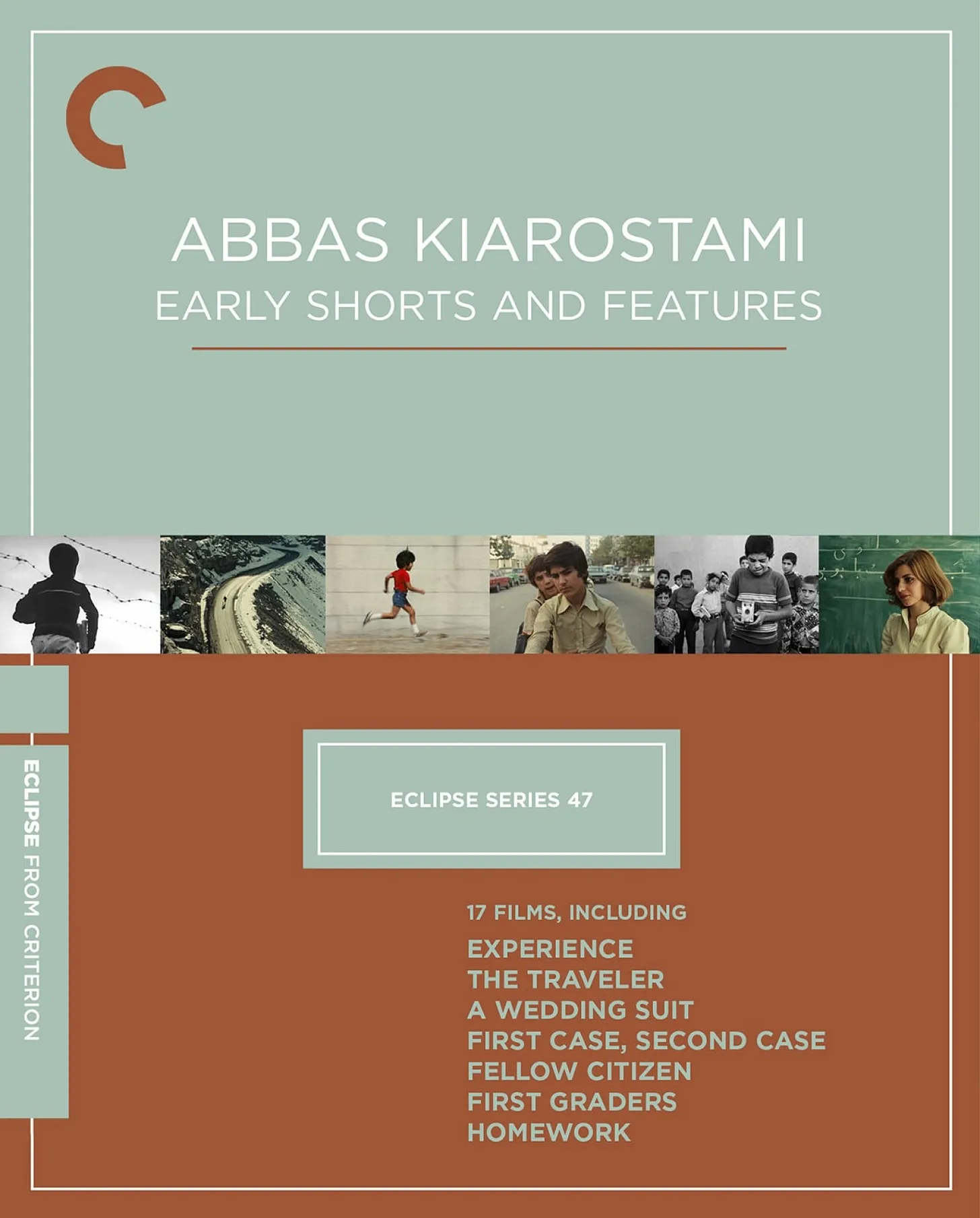 |
I have written a long essay to accompany a Criterion three-disc set featuring the early work of Iranian director Abbas Kiarostami, produced between 1970 and 1989. This release relaunches the Eclipse series for the home video label, with Imogen Sara Smith serving as the series new editor.
All of the titles have been restored in 2K by the renowned Bologna-based film restoration laboratory, L’Immagine Ritrovata.
* * *
Tuesday, 29 July 2025
Three Wise Girls (William Beaudine, 1932)
Playing at Harvard Film Archive on November 14, 2025. This note written for that occasion. – EK
Three Wise Girls (1932)
Director: William Beaudine
A luminous Jean Harlow received her first top billing in this pleasurable pre-Code film, made in the popular subgenre of the country-blonde-making-it-big-in-New-York—only to be exposed to the emptiness of success. The film is directed by old Hollywood’s most indefatigable workhorse, William Beaudine, who is credited with somewhere between 400 and 500 films—including masterpieces like Sparrows and cult oddities such as Bela Lugosi Meets a Brooklyn Gorilla. François Truffaut had a soft spot for this imaginative craftsman’s B movies, praising their “charm” and “modesty”—qualities that also apply to the comedy/drama Three Wise Girls. This is one of Beaudine’s classiest and wittiest works from the 1930s, a time when he still had access to stronger material—this script written by Agnes Christine Johnston, who explores the question of virtue versus career, with sharp dialogue penned by Frank Capra’s regular collaborator, Robert Riskin. Among other things, the film includes a memorable lesson on how to “forget about your hips when you walk,” since “they know how to take care of themselves.”
Monday, 28 July 2025
Kalagh [The Crow] (Bahram Beyzaie, 1977)
From the new issue of Sight and Sound (September 2025), dedicated to "More Hidden Gems", here's my pick for a hidden gem that deserves to be restored and revived. – EK
Sunday, 27 July 2025
The story of The Movie Orgy as told by Joe Dante to Alex Fitch
The story of making The Movie Orgy as told to I'm Ready for My Close-Up FM radio show host Alex Fitch. This is my transcription of the radio program. TMO plays today (July 27, 2025) in resorted version in London. – EK
The Movie Orgy [was] the first film that I ever did. It used to run seven hours. It is made entirely of found footage. It came about because in the late 60s, there was a lot of interest in "camp" movies. Susan Sontag's essay had come out and people were discussing the issue. The 1943 Batman serial was released as an entire package. You would go and you would sit in the theatre and you'd watch five hours of chapter plays and you would see all the cheating that went on from the end of chapter two to the beginning of chapter three. "Wait a minute, he got hit by a truck at the end of chapter two but in the beginning of chapter three he rolls away from the truck because they figured after the week went by the kids wouldn't remember." Anyway, it was very funny and it was also interestingly very racist because it was World War II production.
Saturday, 26 July 2025
Great Expectations at the Cinémathèque suisse [in French]
 |
| Pool of London |
Sélection de films britanniques d'après-guerre (1945-1960), en partenariat avec le Festival du film de Locarno à la Cinémathèque suisse.
Avec une rétrospective titrée Great Expectations, le Locarno Film Festival présente, cette année, 45 films britanniques réalisés entre la fin de la Seconde Guerre mondiale et 1960. Dès sa première édition, le festival avait manifesté un réel intérêt pour le cinéma britannique et avait décerné son prix principal à Hunted (1952) de Charles Crichton. La sélection de Locarno – dont plusieurs titres soigneusement choisis seront projetés à Lausanne – célèbre les années marquantes et l’âge d'or du cinéma britannique.
Thursday, 24 July 2025
Four Sided Triangle (Terence Fisher, 1953)
 |
Programme note on Terence Fisher's 1953 film, Four Sided Triangle, whose restoration premiered at Il Cinema Ritrovato 2025.
One of the most distinctive British directors to emerge in the 1950s, Terence Fisher built a cinematic world around the Frankenstein syndrome—duplication through irresponsible science. In this key manifestation of that theme, Freud, the Holy Scriptures, and pulp literature form an unholy alliance. Based on a 1949 novel by William F. Temple, the film is delivered directly to the camera and told in flashback, the latter being a favourite device of Fisher’s in the 1950s. It follows two Cambridge graduates who build a replication machine. When the woman they both love—American blonde Barbara Payton—chooses one of them, the other scientist clones her. Of course, the experiment goes horribly wrong. Early Fisher is a melodrama of extremes, with a perverse depiction of the violence inherent in loving too much, loving unknowingly, loving in the dark.
Friday, 11 July 2025
Great Expectations: British Postwar Cinema Book
Great Expectations
British Postwar Cinema, 1945-1960
Published to coincide with the retrospective at the
78th Locarno Film Festival (2025)
order the book here
It is not an inflated statement to say that among Western European national cinemas, British cinema of the studio era remains one of the least explored internationally. A cinema that was once critically celebrated, consistently presented at international film festivals, and widely distributed – from the best cinemas in Paris to Tehran – epitomised a “golden age” that weakened and fell out of fashion with the arrival of later movements, such as the British New Wave. While recent academic studies of the period in question have been astonishingly rich, the actual act of screening these films has been rare and far between.
Thursday, 10 July 2025
The director who wasn’t there: Mohammad Rasoulof on The Seed of the Sacred Fig
“I am very close to nature. I spend a great deal of time in the mountains. If Iran becomes a free country one day, I’d love to make wildlife documentaries,” says Mohammad Rasoulof, who fled the country last year, crossing the mountainous terrain of western Iran on foot with nothing, not even a passport (which had been confiscated). He sought refuge in Germany and added the final touches there to The Seed of the Sacred Fig, which premiered in Cannes last May. The man who could have been the David Attenborough of Iran is, until further notice, one of the foremost clandestine filmmakers from that country. “For now, the freedom and dignity of man are my top priorities,” he says. “I keep asking myself why a system allows itself to do this to us.”
Great Expectations: British Postwar Cinema, 1945-1960
Retrospective at Locarno Film Festival 2025
Great Expectations: British Postwar Cinema
1945-1960
Though not quite the “lost continent” it was once called, British cinema still remains under-explored by international audiences. Featuring 45 titles, this retrospective celebrates some of the defining years of British cinema—a “golden age” of sorts— structured around the question of Britishness and life in the British Isles as reflected through its postwar cinema.
Presenting both major classics and some lesser-known, if equally worthy, titles, across a wide range of genres – comedies, melodramas, crime films, and literary adaptations – this selection focuses solely on contemporary films (no period pieces, WWII narratives, or fantastical premises) and pointedly excludes the New Wave and Kitchen Sink movements whose early years overlapped with the period covered here. Although the retrospective includes a handful of documentaries for context, the primary focus remains on narrative films.
Thursday, 3 July 2025
Il Cinema Ritrovato 2025: Favourites & Discoveries
 |
| Artists and Models |
Il Cinema Ritrovato XXXIX concluded on June 30. With 140,000 admissions, the attendance was comparable to that of the previous edition. However, the scorching temperatures resulted in more foot blisters.
This survey is not a competition but a compendium showcasing what you missed so that you can catch up later. (195 festival attendees have voted.) Your local cinematheques and festivals might consider showing these films if you can convince them that the diversity and adventurous selection is essential for keeping film culture alive. (And good luck doing that!) Those who complain that some strands were not as rewarding as they expected miss an important point: if we do not screen these films, nobody else will.
The festival has screened Battleship Potemkin and One Hour with You, yet they do not appear in any lists. I would like to think this suggests that these films have already been seen and enjoyed as both favourites and discoveries. Still, one person’s obvious title may be another’s revelation. I see that as part of the excitement of what we do. So, please take this list as just a reference—nothing more and nothing less.
There is a sense of purpose in programming Il Cinema Ritrovato, even if it is not immediately apparent to an outsider. Everything is centered on reevaluating the history of cinema, and with that come our political and social ideas and biases. However, the framework is almost always aesthetic—a bad film about a significant subject remains a bad film. Duke Ellington once said there are two kinds of music: the good music and the other kind. In our case, we avoid the "other kind."
Thursday, 12 June 2025
Katharine Hepburn: All About Me (David Heeley, 1993)
 |
| Cover of All About Me's VHS edition of |
Playing on June 18, 2025 at Il Cinema Ritrovato XXIX. – EK
Katharine Hepburn: All About Me (David Heeley, 1993)
When Katharine Hepburn appeared in All About Me at age 85, it was a year after she had published her autobiography, Me: Stories of My Life – stories from which she repeats on camera. Not exactly all about her, but still very much focused on a star who was, at various times, deemed “unusual,” “box office poison,” and a feminist trailblazer in a film industry built on familiarity, money, and misogyny.
Friday, 6 June 2025
Il Cinema Ritrovato 2025 | Films on Film
 |
| Summertime by David Lean, shot in Venice, in colour, on 35mm |
Il Cinema Ritrovato shows more films on film — from 35mm, 16mm, and 70mm prints — than any other festival in the world. (If you have any doubt, ask FedEx or DHL.)
This year, 130 titles will be projected from celluloid. It's true that a good number of these belong to early cinema, but there is an equally substantial selection—from the silent period to the early 21st century—shown in archival prints and occasionally brand-new prints.
Here is a list of 50 titles to be shown on film that I think are worth adding to your schedule, once the schedule is out!
Wednesday, 4 June 2025
Il Cinema Ritrovato 2025: Twenty Recommendations
Tuesday, 3 June 2025
Safar (Bahram Beyzaie, 1972)
%20(c)%20Kanoon_da%20Mk2%20(3).jpg) |
| Safar |
Written for the world premiere of the brand new restoration (from the camera negative) at Il Cinema Ritrovato 2025. – EK
A 12-year-old orphan with a habit of seeking out his potential parents takes his friend along on a journey through the wastelands on the outskirts of Tehran. Seemingly a children’s folk tale, Safar is so visually singular that it evades easy breakdown. It is allegorical, but allegory is the engine; visual density the result.
Sunday, 1 June 2025
Online with SFFP—Discussing the Work of Lewis Milestone
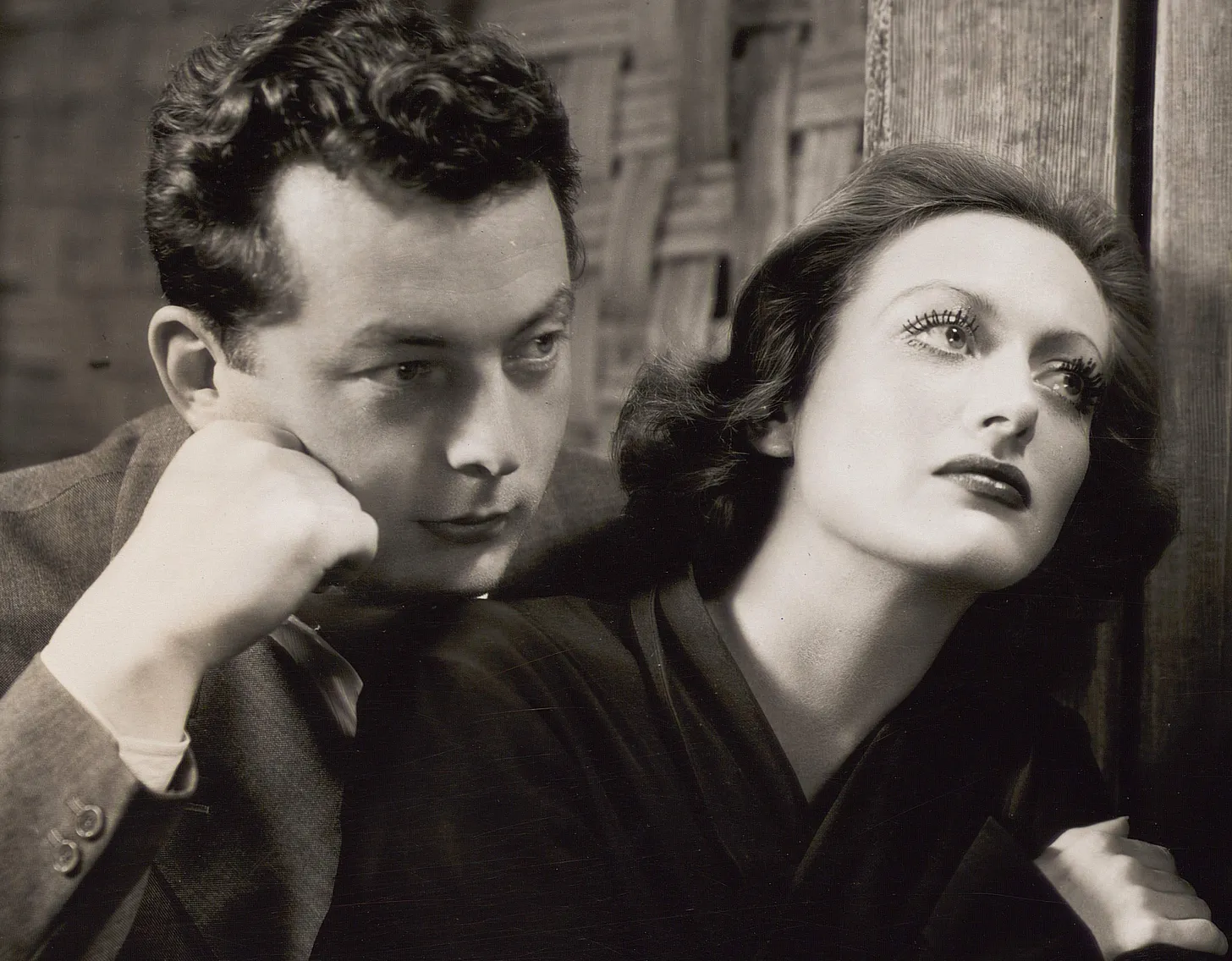 |
| Lewis Milestone with Joan Crawford during the shooting of Rain (1932) |
On Thursday, June 5, SFFP Board President Rob Byrne will be joined by Ehsan Khoshbakht to discuss Lewis Milestone’s incredible body of work, including—of course—The Garden of Eden, which SFFP restored!
This event is free and open to everyone. Simply register below to attend.
Friday, 23 May 2025
Cecil Taylor à Paris (Gérard Patris, 1968)
The brand-new restoration of Cecil Taylor à Paris, courtesy of INA, will be premiered at the 2025 edition of Il Cinema Ritrovato. – EK
“He doesn’t come from my community,” replies avant-garde jazz pianist Cecil Taylor, hidden deep behind dark glasses, when asked by the interviewer about Stockhausen. The same response follows for questions about Bach and John Cage. In a style characteristic of 1968, the African-American musician, filmed for Cecil Taylor à Paris in an old French palace with oversized chimneys, dismisses European traditions in favour of “across the track” culture – the lived experiences of African-Americans.
Monday, 19 May 2025
Ida Lupino: The Best of Her Television Work
My selection of Lupino's TV work as a director will play at Close-Up Cinema on May 25. – EK
The London-born Hollywood movie star Ida Lupino, known as one of the screen’s 'tough girls', found acting insufficient for her intellectual and social ambitions. In 1949, she ventured into directing, “investigating the social condition of women in contemporary society.” With Dorothy Arzner retired, Lupino became the only active female director in Hollywood at the time. Her remarkable directorial output has been restored and widely screened in recent years. However, her rich, and fascinating body of work for television – usually individual episodes within ongoing series – remains largely unexplored. These works encompass proto-feminist stories, genre pieces, and tightly knit dramas. This programme features some of Lupino’s most outstanding television work from the 1950s and 1960s.
Monday, 12 May 2025
Il Cinema Ritrovato 2025 | Which Films Play in Each Strand
Sunday, 11 May 2025
Lewis Milestone Retrospective at Il Cinema Ritrovato 2025
 |
| Milestone (left) on the set of Rain with Joan Crawford |
Lewis Milestone: Of Wars and Men
A milestone of visual flair and virtuosity in American cinema, the career of Lewis Milestone – a Russian Jewish émigré – bridged silent cinema and the 70mm spectacles of the 1960s. Renowned for having one of the most distinctive and eclectic styles of his generation, his popular and dazzlingly original work ranged from the anti-war magnum opus All Quiet on the Western Front to the popular-front musical Hallelujah, I’m a Bum!. As dense, dark, and daunting as his films could get, they were often laced with wit, camaraderie, and bravery amid mass atrocities. Yet, he barely survived the Hollywood blacklist, which forced him to drift into mediocre assignments. This programme, covering his silent films up until the blacklist, features new restorations and archive prints, aiming to recover the artistry of a man who fought many battles of humanity in the 20th century with a sense of wisdom and poetry that can still shake us.
Monday, 24 March 2025
Centenary screening of Grass (1925) with live music by Payman Yazdanian
 |
| Grass |
Screening at Kings Place, London, on May 25, 2025. I'll be introducing the screening. Book here.
Grass (1925), one of the canonical greats of the silent era by the directorial team of Merian C. Cooper and Ernest B. Schoedsack—today mostly remembered for their iconic sound-era cult film King Kong—is a documentary on the heroic annual migration of the nomadic Bakhtiari tribes of Iran. It is an epic film about people who live epic lives. The restless filmmakers identify with the people they follow, transforming their journey into some of the grandest vistas of silent cinema ever captured on film.
Saturday, 22 March 2025
British Postwar Cinema: Five Personal Favourites
 |
| The Passionate Friends |
Five personal favourites from the upcoming British Postwar Cinema 1945-1960 retrospective at Locarno.
Thursday, 13 March 2025
Understanding the Dark Edge: British Postwar Cinema at Locarno – A Conversation
 |
| (c) Locarno International Film Festival |
A conversation with Locarno’s Christopher Small about my new curatorial project for the festival's 2025 retrospective, Great Expectations: British Postwar Cinema, 1945-1960. A slightly different edit of the conversation can be accessed here on Locarno’s website.
Locarno: Was there a single film that catalysed the idea for this retrospective in your mind?
Ehsan Khoshbakht: A Diary for Timothy (1945) by Humphrey Jennings. It is a remarkable film made during the final stages of World War II, with the knowledge that the war would soon end. The film then asks, 'What next?' It shows a child being born and poses the question: What will happen to this child? How can we make the world a better place for Timothy? I immediately thought of doing a retrospective to explore what happened to that child, following his life and the lives of the people around him.
Monday, 10 March 2025
Great Expectations: British Postwar Cinema | Variety Interview
"August’s Locarno Film Festival will go British with its latest retrospective: Great Expectations: British Post-War Cinema, 1945-1960.
The retrospective forms a major strand of the film festival’s programming and for many festival goers is a standout and popular attraction. Boasting fresh restorations and rare screenings of difficult to get prints, past seasons have been devoted to filmmakers such as Douglas Sirk or studios such as last year’s retrospective, The Lady with the Torch, which celebrated the centenary of Columbia Pictures.
Great Expectations: British Post-War Cinema, 1945-1960 is organized by the Locarno Film Festival in partnership with the BFI National Archive and the Cinémathèque Suisse, with the support of Studiocanal. The film curator responsible for the last program, Ehsan Khoshbakht, returns this year with Great Expectations. He spoke exclusively with Variety about the lineup and the rules dictating his selection."

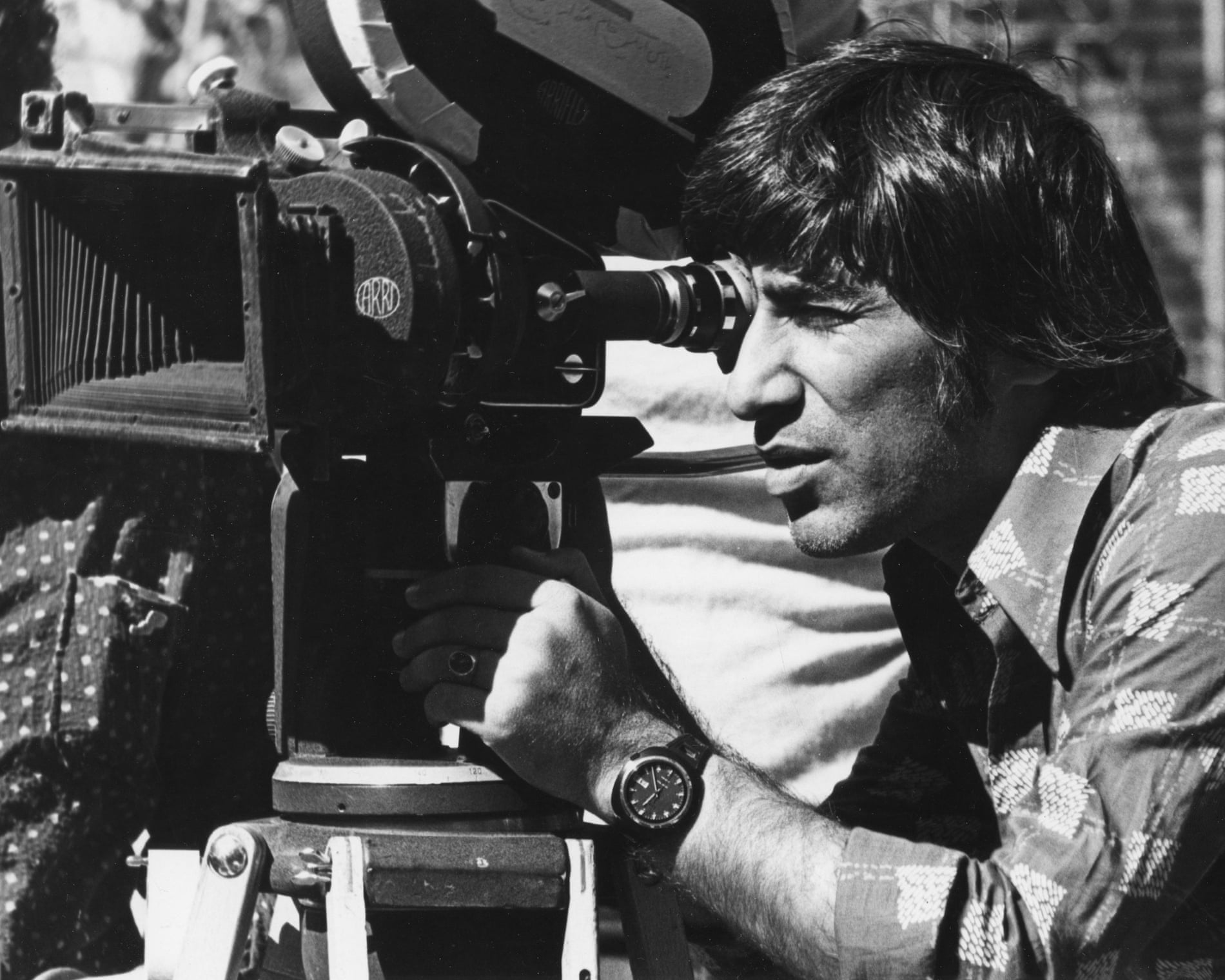

.jpg)



.jpg)
.jpg)



.jpg)
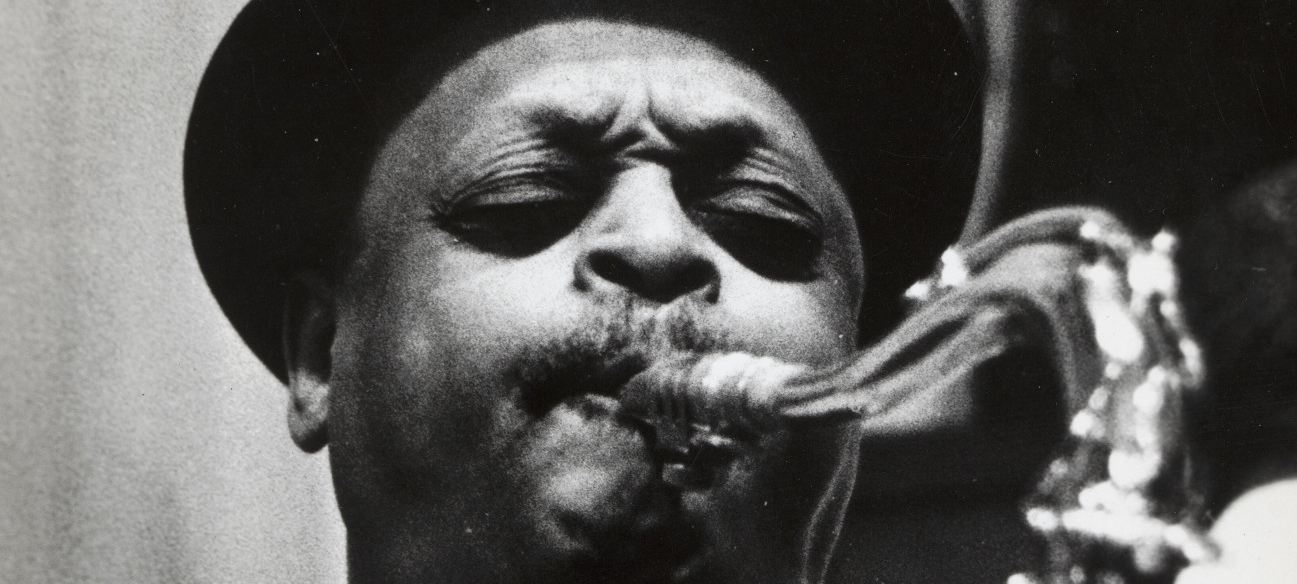



.jpg)

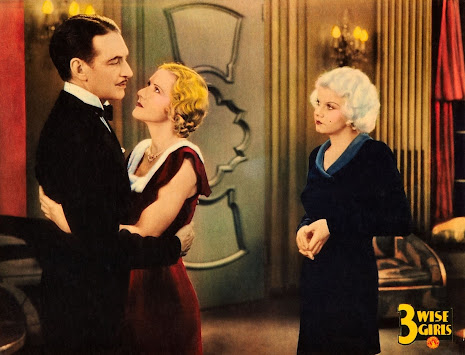
.jpg)






